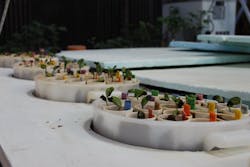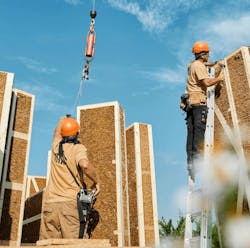Traditional building materials like concrete, steel, and aluminum account for 23% of total global emissions in the built environment, according to Architecture 2030, but what if building products worked in tandem with their ecosystems rather than hurting them through invasive extraction and manufacturing emissions?
Product manufacturers like Soy Technologies, LLC, Modern Mill, and EcoCocon seek to make that hypothetical a tangible reality through plant-based materials that benefit the environment from cultivation to construction. Soy-based products like SoyGreen paint stripper, tile and grout stripper, and adhesive remover from Soy Technologies are manufactured in Nicholasville, Ky from locally sourced soybeans.
Just two states away, Modern Mill recently debuted its latest decking material manufactured in the heart of Mississippi from upcycled rice hulls. Even across the pond, Lithuania-based EcoCocon is trying its hand at carbon-sequestering panelized systems produced from straw and wood.
Soy: More Than Just a Food CropEven before Soy Technologies’ products are developed through the company’s bio-based chemistry process, the soybeans used to create them work as active carbon capturers nearby. “As soy plants grow, they remove greenhouse gasses from the atmosphere,” explains the United Soybean Board (USB) in its 2010 Life Cycle Assessment Study. “In the United States alone, the total cultivation of 3.36 billion bushels of soybeans in 2009 eliminated the carbon equivalent of 21 million automobiles,” according to research conducted by USDA's National Agricultural Statistics Service (NASS) and the Environmental Protection Agency.
Not only is soy a renewable resource, but because it’s an easily cultivated food crop, soy products are also a cost-effective alternative to petroleum-based and mineral products. Current production levels of crude soybean oil average roughly 20 billion pounds per year in the United States alone, according to the United Soybean Board, a large enough share to replace refined vegetable oil.Low VOC construction materials like soy adhesives are “drop-in replacements for urea-formaldehyde adhesives, which emit (off gas) formaldehyde into building indoor air,” USB explains. As the benefits are further studied and soy production is increased nationwide, manufacturers are catching on. Soy Technologies has expanded across the United States since 2003 and now exports in international markets, while corporate companies like Sherwin-Williams and Rust-Oleum are launching hybrid soy resins and soy-based wood stains for the U.S. market.
Upcycled Alternatives—Modern MillMeanwhile, companies like Modern Mill are exploring alternative plant solutions like integrating rice hulls into composite decking materials as a sustainable lumber replacement. Acre by Modern Mill is manufactured in the United States from upcycled rice hulls, a by-product of rice production. Based in Fernwood, Mississippi, Modern Mill uses a patented technology that melds together organically-sourced rice hulls without phenol, formaldehyde, or adhesives while maintaining the look and feel of real wood.
Just like traditional decking materials, Acre can be sanded, stained, and painted, but unlike lumber, Modern Mill’s plant-based decking requires little maintenance and is 100% recyclable, according to the company site. Similar to the production of Soy Technologies’ materials, Acre is manufactured in a zero-waste facility, and because it’s naturally sourced, Modern Mill’s flagship product sequesters and filters more carbon than it emits.
Upcycled Alternatives—EcoCoconOn the opposite side of the globe, EcoCocon is combatting resource scarcity with panel systems that consist of 10% wood and 89% straw sourced as a by-product of wheat or rye production. The company claims that since its inception, it has constructed “20,000 m² of EcoCocon walls, sequestering more than 1,500 metric tons of CO2 and saving at least another 9,000 metric tons over the life cycle of [its] buildings.” EcoCocon panels have passed National Technical Assessments, Fire Resistance Tests REI 120 and REIef 120, and have won sustainability awards for their renewable production and durability when put to the test in residential buildings.
Not only are alternative products manufactured from soy, rice hulls, and straw more eco-friendly, but they also pass performance and safety ratings to function as possible replacements for traditional materials. Soy Technologies’ coatings and adhesives are non-flammable and use little to no harmful chemicals or additives, the company says, while flooring and paneling products from Modern Mill and EcoCocon are dense, airtight, and water-resistant.
Onward and Upward—The Bigger Picture
The USGBC’s LEED certification system rewards soy and rice-based products in its Materials and Resources (MR) section, according to USB, which seeks to “transform material use and disposal through the use of products, materials, and processes that possess attributes associated with lower environmental impacts.” By using less fossil fuels than traditional manufacturers, Modern Mill, Soy Technologies, and EcoCocon do just that, but in order for plant-based products to have a monumental impact on the industry at large, many more companies will need to get on board.
New plant-based building materials hitting the market are seemingly few and far between, but the presence of eco-friendly building alternatives at the 2022 International Building Show signals a shift toward sustainability that is slowly but surely catching on. While much more research and expansion remains for the world of plant-based building, the United Soybean Board and companies like Soy Technologies, Modern Mil, and EcoCocon are leading the charge toward what they hope to be an effective and long lasting change.




